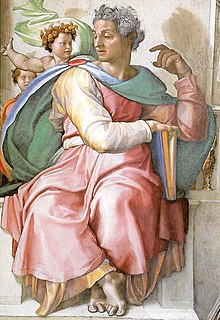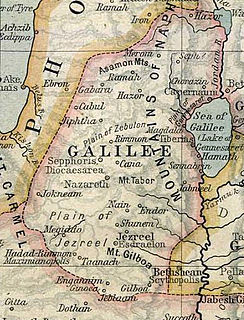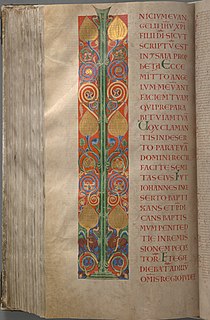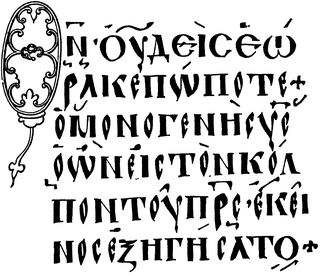
The Book of Isaiah is the first of the Latter Prophets in the Hebrew Bible and the first of the Major Prophets in the Christian Old Testament. It is identified by a superscription as the words of the 8th-century BCE prophet Isaiah ben Amoz, but there is extensive evidence that much of it was composed during the Babylonian captivity and later. Johann Christoph Döderlein suggested in 1775 that the book contained the works of two prophets separated by more than a century, and Bernhard Duhm originated the view, held as a consensus through most of the 20th century, that the book comprises three separate collections of oracles: Proto-Isaiah, containing the words of the 8th-century prophet Isaiah; Deutero-Isaiah, the work of an anonymous 6th-century BCE author writing during the Exile; and Trito-Isaiah, composed after the return from Exile. Isaiah 1–33 promises judgment and restoration for Judah, Jerusalem and the nations, and chapters 34–66 presume that judgment has been pronounced and restoration follows soon. While virtually no scholars today attribute the entire book, or even most of it, to one person, the book's essential unity has become a focus in more recent research.

Isaiah was the 8th-century BC Israelite prophet after whom the Book of Isaiah is named.

John the Baptist was an itinerant preacher active in the area of the Jordan River in the early 1st century AD. He is also known as John the Forerunner in Christianity, John the Immerser in some Baptist Christian traditions, and Prophet Yaḥyā in Islam. He is sometimes alternatively referred to as John the Baptizer.

Matthew 2 is the second chapter of the Gospel of Matthew in the New Testament. It describes the events after the birth of Jesus, the visit of the magi and the attempt by King Herod to kill the infant messiah, Joseph and his family's flight into Egypt, and their later return to live in Israel, settling in Nazareth.

Matthew 3:3 is the third verse of the third chapter of the Gospel of Matthew in the New Testament. The verse occurs in the section introducing John the Baptist. This verse links John The Baptist to messianic prophecies.

Matthew 3 is the third chapter of the Gospel of Matthew in the New Testament. It is the first chapter dealing with the ministry of Jesus with events taking place some three decades after the close of the infancy narrative related in the previous two chapters. The focus of this chapter is on the preaching of John the Baptist and the Baptism of Jesus.

Matthew 4:14–15 are the fourteenth and fifteenth verses of the fourth chapter of the Gospel of Matthew in the New Testament. In the previous verses Jesus returned to Galilee after hearing of the arrest of John the Baptist and then left Nazareth for Capernaum. These introduce and then contain the first portion of a quote from the Book of Isaiah showing how these movements were preordained by scripture.

Mark 1 is the first chapter of the Gospel of Mark in the New Testament of the Christian Bible.

Matthew 8:17 is the 17th verse in the eighth chapter of the Gospel of Matthew in the New Testament.
Matthew 15:7 is a verse in the fifteenth chapter of the Gospel of Matthew in the New Testament.

Matthew 15:23 is a verse in the fifteenth chapter of the Gospel of Matthew in the New Testament.
The New Testament frequently cites Jewish scripture to support the claim of the Early Christians that Jesus was the promised Jewish Messiah, but few of these citations are actual predictions in their original context. The majority of these quotations and references are taken from the Book of Isaiah, but they range over the entire corpus of Jewish writings.

"This Is the Record of John" is a verse anthem written by the English composer Orlando Gibbons (1583—1625). It is based on a text from the Gospel of John in the Geneva Bible and is a characteristic Anglican-style composition of its time. "John" refers to John the Baptist. The piece is divided into three sections, each beginning with a verse for solo contratenor followed by a full section, echoing words of the verse. The singers are usually accompanied by organ: a viol consort is another possibility, although it is debatable how frequently viols would have been used in Jacobean services.

Arguments that prophecies of Muhammad exist in the Bible have formed part of Muslim tradition from the early history of Muhammad's Ummah. A number of Christians throughout history, such as John of Damascus and John Calvin, have interpreted Muhammad as being the Antichrist of the New Testament.

Messiah, the English-language oratorio composed by George Frideric Handel in 1741, is structured in three parts. The wordbook was supplied by Charles Jennens. This article covers Part I and describes the relation of the musical setting to the text. Part I begins with the prophecy of the Messiah and his virgin birth by several prophets, namely Isaiah. His birth is still rendered in words by Isaiah, followed by the annunciation to the shepherds as the only scene from a Gospel in the oratorio, and reflections on the Messiah's deeds. Part II covers the Passion, death, resurrection, ascension, and the later spreading of the Gospel. Part III concentrates on Paul's teaching of the resurrection of the dead and Christ's glorification in heaven.

Malachi 4 is the fourth chapter of the Book of Malachi in the Hebrew Bible or the Old Testament of the Christian Bible. This book contains the prophecies attributed to the prophet Malachi, and is a part of the Book of the Twelve Minor Prophets.
Isaiah 40 is the fortieth chapter of the Book of Isaiah in the Hebrew Bible or the Old Testament of the Christian Bible, and the first chapter of the section known as "Deutero-Isaiah", dating from the time of the Israelites' exile in Babylon. This book contains the prophecies attributed to the prophet Isaiah, and is one of the Books of the Prophets. Parts of this chapter are cited in all four canonical Gospels of the New Testament.

John 1:20 is the twentieth verse in the first chapter of the Gospel of John in the New Testament of the Christian Bible.
John 1:21 is a verse in the first chapter of the Gospel of John in the New Testament.
Matthew 12:17,18 are two verses in the twelfth chapter of the Gospel of Matthew in the New Testament.















